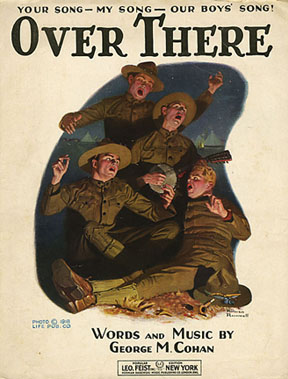
In the words of George M. Cohan from about a century ago, Johnny got his gun and the Yanks went “over there” and “they won’t come back ’til it’s over over there.” Billy Murray (the singer you probably do not know) sang it on Edison Records (the blue amberol cylinders you may never have heard). American troops have been over to several other “theres” since World War I, but ironically the longest lasting one has officially ended this morning in Iraq. There are only 4,000 troops of a high of 170,000 still left on the ground, a number less than the total of U.S. forces killed during the last nine years in Iraq. But if you think this is really “over”, think twice. The U.S. embassy will be the largest in the world with 15,000-16,000 people taking over a former air base.
The lingering question, for those who are even aware that Iraq is still on the current events map, is whether or not it was worth it. What started out as a big “if” (if there were weapons of mass destruction in Iraq) has made this an ever bigger “it.” As a ground war it was almost over as soon as it began. Sweeping through Iraqi territory to Baghdad was on the order of a Blitzkrieg; it was the ersatz policy for ensuring peaces that has been the problem. Iraq had no stockpiles of wmds. Yes, Saddam was a brutal dictator that most Iraqis were glad to see go, but few Iraqis have enjoyed the American occupation that ensued. The sectarian violence that continues to this day has ripped the society apart. Age-old fault lines of ethnic and religious were buried in historical rhetoric, but it was our invasion and inept mopping up that opened the wounds anew. The blood of tens of thousands of Iraqis is a legacy of this war that tarnishes any sense of having a “mission accomplished.”
Was the war worth it? In hindsight there are many wars that seem only to have made matters worse. Innumerable Ph.D. theses in political science and eventually history will render verdicts into the foreseeable future. From a strategic point of view in strict realist terms, there is one less dictator around, but Iran has gained strength in the weakness of the current Iraqi regime, many Iraqis justifiably blame the U.S. for the so-called collateral damage that has led to many civilian deaths and for not securing the country from the start. Apart from the obligatory political rhetoric of eternal friendship ties, it is our continued financial support that speaks louder than words of comfort and wisdom.
Let’s face it; at this early juncture it sure looks like we made a mess of things in Mesopotamia. There is no assured peace by the rivers of Babylon today. The damage may not be as devastating as the Mongol destruction of the Abbasid caliphate, but the blood stains will not be washed away soon. Events of the past year, with people protests doing more to topple dictators than invading armies, have overshadowed the winding down of the U.S. involvement in Iraq, but our presence in Afghanistan lingers on. That “over there” is far from over, despite the fact that it was all about something that happened “over here” a decade ago. One day the flag will be lowered on a U.S. military base on Afghan soil, but I suspect Johnny will be asked time and time again to get his guns. It is not really that hard in the modern world to turn swords into plowshares, but AK-47s and drones are far more stubborn objects. And as long as wars “over there” can increasingly be fought digitally over here, conflict is likely to drone on and on.
Daniel Martin Varisco